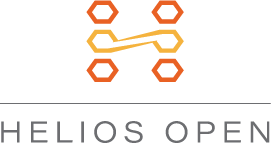HELIOS Open Launches with Focus on Collective Action
On March 31, 2022, presidents and high-level presidential representatives from 65 colleges and universities participated in the first convening of the Higher Education Leadership Initiative for Open Scholarship (HELIOS Open). HELIOS Open emerges from the work of the National Academies of Sciences, Engineering, and Medicine’s Roundtable on Aligning Incentives for Open Science. Current members collectively represent 1.8 million students, faculty, and staff. The key outcome of the meeting was a clear commitment to collective action to advance open scholarship.
In their opening remarks, each HELIOS Open co-chair emphasized the importance of coordinated, scalable activities in support of open scholarship. Speaking of HELIOS Open’s potential, Arizona State University President Michael Crow described facilitating “movement toward modern scholarship-based science that is [as] wildly open as it was in pre-scholarship modality, with more cultural awareness, cultural engagement, and intergenerational communication and understanding across various elements of our broadly scoped societies.”
Johns Hopkins University President Ron Daniels emphasized the role higher education plays in advancing open values: “Colleges and universities are one of the most vital fact generating and fact checking institutions within democratic society. One of their core obligations is to share facts with the public and inform the creation of sound policy, and to check the claims of those who are in power. The more that we can share facts and ideas beyond our walls, the more we can prove our worth to the democratic project and improve the lives of those who stand to benefit the most from the work that we're doing.”
In her remarks, Benedict College President Roslyn Artis stressed the importance of open scholarship as the head of an historically black liberal arts college: “Institutions large and small, with a diversity of ideas, research capacity, and acumen, have something to contribute — within disciplines; across disciplines; and in research teams across institutions, states and regions—to create collaborative solutions to complex problems. The ability to collaborate more effectively, across institutions, is stimulated by open research.”
Geeta Swamy, HELIOS Open’s Strategic Lead and Duke University Associate Vice President for Research and Vice Dean for Scientific Integrity, then provided an open scholarship case study in the form of Duke’s Research Data Initiative, which serves as a central hub for campus open data and research activities. “Open science can be key in gaining the public's trust and appropriately stewarding the work that they are entrusting us to do. Making research open allows people to see our work and contributes to the culture of research integrity.”
In pre-meeting survey responses and during meeting breakouts, HELIOS Open participants expressed interest in forming working groups focused on the following key areas:
Drafting guidance for students and faculty to clearly and succinctly articulate good practices for sharing specific forms of open scholarship (e.g., papers, data).
Engaging with other key stakeholders (e.g., government agencies, philanthropies, professional societies, publishers) to align open scholarship policies and incentives.
Collaborating with other institutions on shared resourcing and infrastructure.
Identifying policy language that can be adapted and adopted by departments on our campus, and/or across the entirety of the institution.
HELIOS Open members will convene over the coming months to begin scoping priorities and developing testable recommendations. These efforts will inform the next HELIOS Open member meeting, which will be held in late fall. Where possible, HELIOS Open activities will build upon the wealth of tools, case studies, and other resources that have been developed across member institutions and the broader research ecosystem, developing complementary outputs as appropriate.
During the meeting, Greg Tananbaum Director of the Open Research Funders Group and liaison between HELIOS Open and the National Academies of Sciences, Engineering, and Medicine’s Roundtable on Aligning Incentives for Open Science, noted that the scope and tenor of HELIOS Open interventions will vary across the membership: “Success will look different for different members. We aren’t all starting at the same place and we won’t all end up in the same place. This is a feature not a bug. The purpose of HELIOS Open is not to lay down lines in the sand. It’s to encourage each member to take steps that are appropriate for their specific community.”
President Daniels added, “I’m excited about the work that lies ahead for this group. It’s a wonderful opportunity for us to exchange ideas, share best practices, and take action together as a coalition of the willing. If we can help move the entire academic research enterprise toward greater openness, we can make our research and our democracy stronger and better. I know this is a big and lofty charge, but I think it's one that's worth pursuing. The stakes are simply too high not to.”
The project is supported by grants from the Howard Hughes Medical Institute, the John Templeton Foundation, Schmidt Futures, and Templeton World Charity Foundation. Institutions interested in joining HELIOS Open should contact caitlin@orfg.org for more information.
